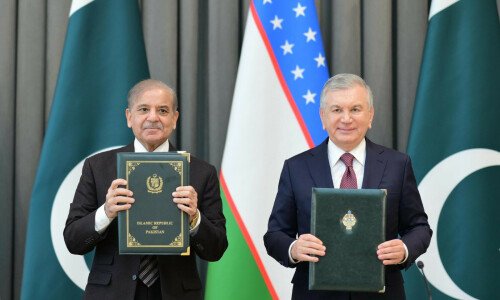Pakistan and Uzbekistan have agreed to expand bilateral trade to $2 billion, as Prime Minister Shehbaz Sharif met with Uzbek President Shavkat Mirziyoyev in Tashkent on Wednesday. The agreement marks a significant step in strengthening economic ties between the two nations, following a $1 billion trade deal signed in 2023.
The development comes shortly after Pakistan reached a similar agreement with Azerbaijan to boost investments to $2 billion during PM Shehbaz’s recent visit to Baku. The prime minister is on a two-day state visit to Uzbekistan, accompanied by a high-level delegation.
Strengthening Economic Cooperation
During a bilateral meeting, PM Shehbaz and President Mirziyoyev discussed ways to enhance trade and economic collaboration. The talks were followed by the signing of several memorandums of understanding (MoUs) in various sectors, including industrial cooperation, youth affairs, science and technology, and visa-free travel for diplomatic passport holders.
Addressing a joint press conference, President Mirziyoyev described the negotiations as “very fruitful” and highlighted the growing trade turnover between the two countries, which has already exceeded $400 million. He expressed optimism about achieving the $2 billion trade target and emphasized the importance of regional connectivity.
“Pakistan is a trusted partner and a promising ally,” President Mirziyoyev said, praising PM Shehbaz’s efforts to ensure peace, stability, and economic growth in Pakistan. He also noted the establishment of 130 joint ventures between the two countries and the opening of trade houses in Karachi and Tashkent.
Expanding Connectivity and Collaboration
The leaders announced plans to expand air travel routes, including new flights between Samarkand, Bukhara, Karachi, and Lahore. President Mirziyoyev also invited Pakistani companies to invest in Uzbekistan, pledging to create favorable conditions for their operations.
A high-level strategic council will be established to oversee the implementation of bilateral agreements, with regular updates from ministries and relevant bodies. The council will focus on enhancing cooperation in areas such as pharmaceuticals, textiles, agriculture, and energy.
Trans-Afghan Railway Project
The two leaders reaffirmed their commitment to the Trans-Afghan Railway project, which aims to connect Pakistan and Uzbekistan through Afghanistan. PM Shehbaz described the project as a “game changer” for regional connectivity and trade. President Mirziyoyev announced the formation of a joint committee to address challenges and accelerate progress on the railway link.
Cultural and Diplomatic Ties
The leaders also emphasized the importance of cultural exchanges and people-to-people connections. President Mirziyoyev expressed support for Pakistan’s stance on Afghanistan’s social development and the Palestinian issue. He accepted PM Shehbaz’s invitation to visit Pakistan and extended his well wishes for the upcoming month of Ramadan.
PM Shehbaz praised Uzbekistan’s progress in reducing poverty and attracting foreign investment, drawing inspiration for Pakistan’s own economic development. He highlighted Pakistan’s recent achievements, including a decline in inflation and interest rates and a rise in IT exports.
Business Forum and Future Cooperation
Later in the day, PM Shehbaz visited the Techno Park in Tashkent to observe Uzbekistan’s construction industry. He also addressed the Pakistan-Uzbekistan Business Forum, where leading businessmen from both countries held B2B meetings to explore new trade opportunities.
The visit underscores Pakistan’s commitment to strengthening ties with Uzbekistan through economic collaboration and regional integration. The Foreign Office described the relationship as one rooted in shared history, culture, and aspirations for peace and development.
Bilateral trade between Pakistan and Uzbekistan has grown significantly in recent years, increasing from $27 million in 2019-20 to $126 million in 2022-23. Both nations are now focused on further enhancing economic cooperation to achieve their shared vision of prosperity and connectivity.










